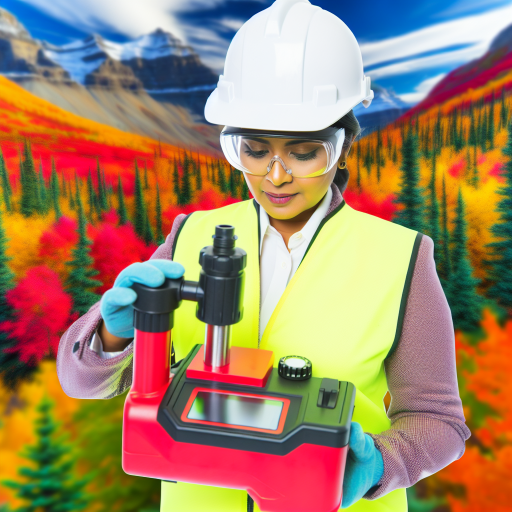Overview of the Petroleum Engineering Field and Its Importance
Introduction to Petroleum Engineering
Petroleum engineering focuses on the exploration and production of oil and natural gas.
It plays a crucial role in meeting the world’s energy needs.
Engineers in this field work to improve the efficiency of oil recovery techniques.
They also contribute to the development of new extraction technologies.
Economic Significance
The petroleum industry significantly impacts the global economy.
Oil and gas remain the primary sources of energy for many countries.
They contribute substantially to national revenues and employment.
Additionally, energy prices influence various sectors, including transportation and manufacturing.
Technological Advancements
Innovation drives the petroleum engineering sector.
Engineers develop advanced tools and techniques for resource extraction.
Technological advancements include enhanced oil recovery and seismic imaging.
These innovations increase efficiency and reduce environmental impacts.
Environmental Considerations
Petroleum engineers address various environmental challenges.
They work on strategies to minimize the ecological footprint of drilling operations.
Furthermore, they explore alternative energy sources to supplement fossil fuels.
Sustainable practices are becoming increasingly important in the industry.
Career Opportunities in Petroleum Engineering
Graduates can pursue diverse roles within the petroleum sector.
Common positions include reservoir engineer, drilling engineer, and production engineer.
Additionally, opportunities exist in research and regulatory compliance.
As the field evolves, new roles focusing on sustainability are emerging.
Education and Qualifications for Petroleum Engineers
Educational Background
A bachelor’s degree is essential for aspiring petroleum engineers.
Most universities offer programs specifically in petroleum engineering.
Some also provide related fields such as geological engineering or mechanical engineering.
Courses typically cover subjects like thermodynamics and fluid mechanics.
Internships during college greatly enhance practical experience.
Unlock Your Career Potential
Visualize a clear path to success with our tailored Career Consulting service. Personalized insights in just 1-3 days.
Get StartedAdvanced Degrees
Many engineers pursue a master’s degree to advance their careers.
A master’s can provide specialized knowledge and skills.
Graduate programs often focus on energy resources or drilling engineering.
Some professionals consider a PhD for research or teaching roles.
This degree can elevate opportunities in academia or industry leadership.
Licensing and Certifications
Licensing is crucial for petroleum engineers to practice professionally.
Engineers typically must pass the Fundamentals of Engineering exam first.
Gaining work experience before taking the Principles and Practice of Engineering exam is important.
Various certifications exist to showcase expertise in specialized fields.
Organizations like the Society of Petroleum Engineers offer valuable credentials.
Essential Skills
Strong analytical skills are vital for success in petroleum engineering.
Engineers must solve complex technical problems regularly.
Moreover, effective communication is essential for liaising with teams.
Project management skills enhance an engineer’s ability to lead projects.
Additionally, adaptability to new technologies is increasingly important.
Key Skills Required for Career Advancement in Petroleum Engineering
Technical Proficiency
Petroleum engineers must possess strong technical skills in various areas.
Advanced knowledge of geophysical and geological principles is essential.
Familiarity with drilling technology and production techniques enhances competency.
Moreover, engineers should stay updated on industry innovations and technologies.
Analytical Thinking
Critical thinking is vital for solving complex engineering problems.
A petroleum engineer analyzes data to make informed decisions.
Additionally, strong analytical skills support effective project management.
Communication Skills
Effective communication facilitates collaboration within teams and organizations.
Engineers must convey technical information clearly to non-technical stakeholders.
Presenting findings and recommendations is crucial for project success.
Leadership and Management
Leadership skills empower engineers to guide teams effectively.
Effective management of resources and personnel is critical in large projects.
Furthermore, mentorship roles contribute to professional development within teams.
Project Management
Petroleum engineers often lead large-scale projects from inception to completion.
They must understand project life cycles, budgeting, and scheduling.
Utilizing project management software can enhance efficiency and outcomes.
Problem-Solving Abilities
Proactive problem-solving ensures smooth operations in challenging situations.
Engineers should develop innovative solutions to optimize processes.
Moreover, troubleshooting skills are essential for addressing technical issues quickly.
Adaptability and Continuous Learning
The petroleum industry is constantly evolving, requiring adaptability.
Engineers must embrace new technologies and methodologies.
Continuous professional development through courses and certifications is beneficial.
Find Out More: Metallurgical Engineering Internships for Students
Current Job Market and Demand for Petroleum Engineers
Overview of the Job Market
The job market for petroleum engineers remains robust and competitive.
Increasing energy demands drive the need for skilled professionals in this field.
In addition, advancements in technology create new roles and opportunities.
Moreover, global shifts toward sustainability reshape industry dynamics.
Regional Demand Trends
The demand for petroleum engineers varies significantly by region.
A region like Texas continues to be a hub for petroleum-related jobs.
States with abundant natural resources often present numerous opportunities.
On the other hand, areas transitioning to renewable energy may show a decline.
Industry Developments Influencing Demand
Innovations in extraction technologies enhance the efficiency of oil recovery.
Such advancements require engineers to adapt and learn new methods.
Furthermore, the push for cleaner energy solutions creates a role for engineers.
These engineers will focus on integrating traditional and renewable sources.
Job Growth Projections
According to industry reports, job growth for petroleum engineers shows promise.
The U.S. Bureau of Labor Statistics projects a steady growth rate.
This growth indicates a continued need for engineering talent in the sector.
Additionally, ongoing safety and environmental regulations support job stability.
Skills and Qualifications in Demand
Petroleum engineers need a strong foundation in mathematics and science.
Moreover, expertise in software programs and simulations is increasingly essential.
Hands-on experience with drilling and production processes is advantageous.
Lastly, effective communication skills enhance collaboration within teams.
Delve into the Subject: Mechatronics Engineering Career Path in Canada
Roles and Responsibilities of Petroleum Engineers in Different Industries
Oil and Gas Industry
Pave the way for the extraction of oil and gas resources.
Petroleum engineers design drilling plans and recommend methods for efficient extraction.
They analyze geological data to identify potential drilling locations.
Additionally, they oversee drilling operations to ensure safety and efficiency.
Collaboration with geologists helps enhance resource recovery strategies.
Renewable Energy Sector
Contribute to the development of sustainable energy solutions.
Petroleum engineers apply traditional skills to enhance energy diversification.
They engage in research focused on biofuels and alternative energy sources.
Furthermore, they optimize processes to reduce environmental impacts.
Environmental Consulting Firms
Assist in assessing the environmental impact of oil and gas operations.
Petroleum engineers conduct site evaluations for compliance with regulations.
They develop plans to minimize harmful effects on ecosystems.
Collaboration with policymakers ensures sustainable practices in the industry.
Government and Regulatory Agencies
Work alongside government bodies to shape energy policies.
Petroleum engineers evaluate energy production feasibilities for public projects.
They review industry standards and compliance regulations for safety.
Additionally, they help in preparing reports on resource management practices.
Research and Development Institutions
Engage in innovative research to advance extraction techniques.
Petroleum engineers test new technologies to improve efficiency.
Collaboration with academic institutions drives significant breakthroughs.
They publish findings that contribute to industry knowledge and best practices.
Gain More Insights: Role of Petroleum Engineers in Sustainable Energy
Emerging Technologies in the Petroleum Sector and Their Impact on Career Growth
Introduction to Emerging Technologies
Emerging technologies are transforming the petroleum sector rapidly.
These innovations are shaping the future of the industry.
They also create new career opportunities for petroleum engineers.
Automation and Robotics
Automation enhances efficiency in oil extraction processes.
Robots can perform tasks that are dangerous for humans.
Consequently, these technologies increase safety and productivity.
Engineers skilled in robotics will see high demand.
Advanced Data Analytics
Data analytics plays a pivotal role in decision-making.
Companies use data to optimize drilling operations and reduce costs.
As a result, engineers proficient in data analysis gain an edge.
Understanding big data technologies is essential for career growth.
Digital Twins
Digital twin technology enables the creation of virtual models.
These models simulate real-time operations of oil fields.
They help engineers predict system behavior and improve efficiency.
Moreover, knowledge of digital twin applications enhances career prospects.
Renewable Energy Integration
The shift towards renewable energy is accelerating.
Petroleum engineers are increasingly involved in hybrid systems.
Skills in renewable energy technologies expand career pathways.
Collaboration between traditional and renewable sectors is essential.
Enhancing Skills through Continuous Learning
Staying updated with technology trends is crucial for engineers.
Participating in workshops and training programs is beneficial.
Additionally, pursuing advanced certifications can boost career advancement.
Online courses provide flexible learning options for busy professionals.
The Role of Innovation in Career Development
Innovation drives career growth in the petroleum industry.
Employers value engineers who propose new ideas and solutions.
Engaging in research and development opens up exciting avenues.
Networking within innovative circles can lead to fruitful opportunities.
Future Career Prospects in the Petroleum Sector
Emerging technologies significantly influence career trajectories for petroleum engineers.
By embracing these changes, professionals can unlock new potential.
Investing in education and skills development remains vital.
The petroleum sector will continue to evolve, creating dynamic careers.
Discover More: Career Growth Opportunities for Mechatronics Engineers

Networking and Professional Development Opportunities for Petroleum Engineers
Importance of Networking
Networking plays a crucial role in career advancement for petroleum engineers.
Building connections boosts job opportunities and career growth.
Additionally, networking helps professionals gain insights into industry trends.
It also facilitates collaboration and knowledge sharing among peers.
Joining Professional Organizations
Membership in professional organizations offers valuable resources and connections.
The Society of Petroleum Engineers (SPE) provides networking events and training.
Attending local chapter meetings allows engineers to meet experts in their field.
Moreover, organizations often host conferences and workshops that enhance skills.
Participating in Industry Conferences
Industry conferences are excellent venues for meeting fellow professionals.
These events feature sessions on emerging technologies and best practices.
Engaging with speakers can lead to mentorship opportunities.
Moreover, conferences provide a platform to showcase your work to potential employers.
Online Networking Platforms
Online platforms like LinkedIn allow petroleum engineers to connect globally.
Active participation in groups can lead to collaborations and partnerships.
Sharing articles and expertise establishes one as a thought leader in the field.
Furthermore, online networking can be more accessible for busy professionals.
Continuing Education and Training
Professional development courses enhance skills and knowledge relevant to the field.
Many universities and organizations offer specialized training programs.
Completing certifications adds credibility to a petroleum engineer’s resume.
Staying updated on technology trends ensures competitiveness in the job market.
Mentorship and Guidance
Seeking mentorship can provide invaluable guidance in career decisions.
Mentors can share experiences and insights that help navigate challenges.
Establishing a mentorship relationship often leads to long-term connections.
Additionally, mentoring junior engineers contributes to personal fulfillment.
Certifications and Licenses That Enhance Career Prospects for Petroleum Engineers
Importance of Certifications
Certifications significantly improve job prospects for petroleum engineers.
They demonstrate expertise and commitment to the profession.
Moreover, they are crucial for career advancement in competitive markets.
Common Certifications for Petroleum Engineers
Several certifications can benefit petroleum engineers.
The Society of Petroleum Engineers offers the Professional Engineer (PE) license.
This license validates engineering competence and ethical standards.
Additionally, the American Petroleum Institute provides various training certifications.
These certifications cover critical areas such as safety and environmental management.
Specialized Certifications
Specialized certifications can enhance a petroleum engineer’s skills.
Certifications in areas like drilling and production management are valuable.
Furthermore, the Certified Energy Manager (CEM) credential is beneficial.
It focuses on energy efficiency, a growing concern in the industry.
Licenses and Regulatory Compliance
Obtaining a PE license is often a regulatory requirement in many states.
This license allows engineers to sign off on projects legally.
Additionally, it enhances credibility with employers and clients.
Many states require engineers to continue their education to maintain their licenses.
Career Development Through Continuing Education
Continuing education is essential for career development.
Engineers should attend workshops, webinars, and conferences regularly.
This participation keeps professionals updated on industry trends and technologies.
Moreover, pursuing advanced degrees can further increase career opportunities.
Building a Professional Network
Networking is vital for career growth in the petroleum engineering field.
Joining professional associations opens doors to valuable connections.
Furthermore, attending industry events can lead to job opportunities.
Engaging with peers can provide insights into best practices and innovations.
Trends in Sustainable and Renewable Energy and Their Effects on Petroleum Engineering Careers
Emergence of Renewable Energy Sources
Renewable energy sources continue to rise in prominence.
Solar, wind, and geothermal power are gaining traction.
These trends directly impact petroleum engineering careers.
Many engineers are shifting focus to sustainable energy projects.
Integration of Hybrid Systems
Hybrid energy systems are becoming increasingly popular.
These systems often combine fossil fuels with renewable sources.
Petroleum engineers can play a pivotal role in hybrid technology.
Their expertise in energy systems enhances efficiency and sustainability.
Changing Regulatory Landscape
Government regulations are evolving to promote sustainability.
Policymakers are encouraging the use of cleaner energy.
This shift necessitates adaptive skills from petroleum engineers.
They must navigate new regulations and compliance challenges.
Skill Diversification and Continuing Education
Petroleum engineers can benefit from diversifying their skills.
Knowledge of renewable technologies is increasingly valuable.
Continuing education programs now include sustainable energy courses.
Upskilling helps professionals remain relevant in a changing market.
Collaboration Across Disciplines
Collaboration between disciplines enhances innovation in energy sectors.
Petroleum engineers are partnering with renewable energy experts.
This teamwork fosters new ideas and solutions.
Furthermore, multidisciplinary approaches can reduce environmental impacts.
Future Job Market Dynamics
The job market for petroleum engineers is evolving.
Jobs may increasingly focus on sustainable energy solutions.
Engineers will need to adapt to new industry demands.
Innovative thinking will become a key component of success.
Additional Resources
Is it dumb to become a petroleum engineer? : r/oilandgasworkers




